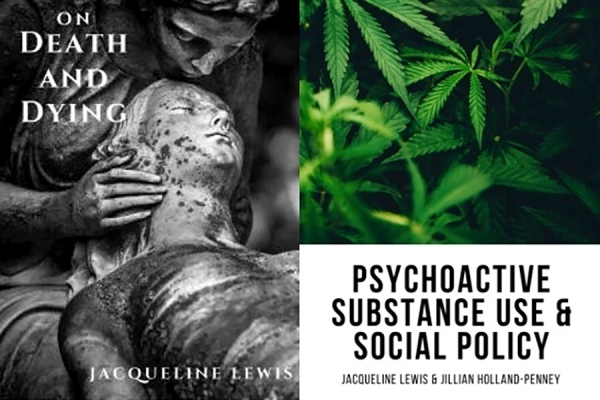 Open-licensed digital content informed texts for two new courses developed by Jacqueline Lewis.
Open-licensed digital content informed texts for two new courses developed by Jacqueline Lewis.
Flexibility is the key to new courses developed by UWindsor professor Jacqueline Lewis — one on death and dying and one on drugs and drug policy.
 Dr. Lewis and her project team, with the support of the Office of Open Learning, created digital content for the online or hybrid courses and accompanying textbooks, funded by $146,746 in grants through the Ontario government’s Virtual Learning Strategy.
Dr. Lewis and her project team, with the support of the Office of Open Learning, created digital content for the online or hybrid courses and accompanying textbooks, funded by $146,746 in grants through the Ontario government’s Virtual Learning Strategy.
“Prior to COVID-19 I had been reimagining the ways I approach teaching to better respond to the evolving ways students learn, as well as their changing interests and needs,” Lewis says. “Remote teaching during the pandemic provided me with the opportunity to further explore some of these ideas, supported by the eCampusOntario funding.”
The courses were designed with both instructors and students in mind.
Lewis’s goal was to develop open-licensed digital content providing instructors with flexibility in the way the courses are offered and students with flexibility in how they can meet their individual learning needs and degree requirements.
She invites all University of Windsor students to consider enrolling.
“I think students will find these courses engaging and will also appreciate that all course materials are freely available to access,” she says.
Versions of the eCampus courses are now incorporated into UWindsor programs of study, including general social science, sociology, political science, and the new interdisciplinary health sciences program. Each is offered with a choice of two course designations enabling students to fulfill their degree requirements.
In Fall 2022, “SACR/SOSC3150 On Death & Dying” is offered as a hybrid online asynchronous/face-to-face class. Students will explore topics related to the study of death and dying, including historical and cross-cultural perspectives, genocide, plagues and pandemics, palliative care and hospice care, medical assistance in dying, grief and bereavement, memorials and commemoration, and death planning.
In Winter 2023, “SOSC/POLS3330 Psychoactive Substance Use & Social Policy” is offered as a fully online asynchronous course. It will consider social factors affecting understanding of psychoactive substances (e.g., alcohol, tobacco, cannabis, opiates, cocaine, psilocybin, club drugs, etc.), their use and relevant social policy, and how these have changed over time.
Both courses combine readings and multimedia resources from a variety of sources and are designed to stimulate critical and personal reflection on complex and challenging issues. The only prerequisite for either is fifth semester or higher standing.
